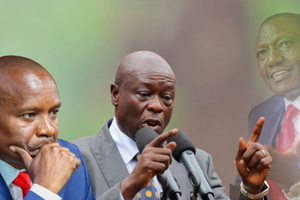Breaking News: Former Lugari MP Cyrus Jirongo dies in a road crash

President William Ruto delivers the State of the Nation address at Parliament Buildings in Nairobi on November 21, 2024.
Things have changed. The Adani deals, after so much surgery, have been left on the table. Riggy G has moved from the hawk-eyed, Raila-blocking watchman of State House to a human rights activist, albeit a popular one. Donald Trump is back, bigger with the entire Congress under his control.
Ugandans are boycotting some Kenyan brands after Kizza Besigye disappeared on Riverside Drive and re-appeared in a Ugandan military court. Even the north magnetic pole is hurtling from Canada towards Siberia at an unprecedented speed of 60km per year, by 2040 the compass north will be pointing east. What does this mean for climate and life?
I am seeing the presidential State of the Nation Address through this prism of uncertainly, the need to change gears, to re-orient the compasses, take stock, learn lessons and deliver for the people. We are in a season of such fundamental change that even the ideological foundations of some of the most powerful political movements in the world, are tectonically shifting.
I think many parts of the world aligned themselves with American liberalism. However, with the collapse of the Democrats at the election and the decision by a vast majority of previously moderate Americans to ally with Donald Trump’s rather right wing conservatism, what does it mean for modern liberalism to which so many owe some allegiance?
Liberalism has evolved over the years from its classical era where it was defined by economic ideas centering on the promise of government to guide the ship of state for the economic prosperity and welfare of the people. I was reading Max Lerner’s article on the evolution of liberalism and how the key economic ideas failed almost a century ago. Welfare states require suffocating, Kenyan levels of taxation. And government projects stopped working as economic stimulants – they produced inflation and very little employment.
Future of our country
An alternative, monetarist idea (successfully) challenged the government-heavy old liberal approach. And the basis of this was that the market was a more efficient economic allocator of resources in pursuit of profit and that central planning was inherently tyrannical.
And in came the Reagan-Thatcher deregulation season which saw divestiture and privatisation of state enterprise and the government basically getting out of the way of the market, culminating in the financial collapse of 2007-8 which was blamed on insufficient regulation of banks and capitalism in general. The market is good, but you have to keep a beady eye on it, right?
Liberalism was like a stone rolling downhill, collecting mud as it went along, shifting emphasis from economic ideas of central planning and income distribution to civil rights, the rights of women, gays, lesbians and racial minorities, support for migration and gathering pace to the point of telling children that they might have been born in the wrong body and that it was ok to be one gender but identify as God knows what. At which point liberalism is looking really radical with its support for wars all over the place and conservatism is looking moderate with Trump preaching peace in Ukraine and the Middle East.
How do small, weak (piss-ant?) countries align?
In life, you can’t work without a set of ideas around which you organise yourself. I see business people have thinking models. Others have ideologies. What are we organising our national life, our dreams for the future of our country, around? Surely, it can’t just be about our tribes and making humongous amounts of money.
Fantastic opportunity
Whatever we call it, I think we should base our mobilisation and our decision making on a true belief in democracy, human rights and the sanctity of the life and liberty of every Kenyan.
Secondly, large groups of people cannot be informally organised. You end up with chaos. I think there should be a firm return to clearly articulated principles which guide formal, structured, consultative decision making, rather than on-the-hoof, off-the-cuff declarations. Decision making is not just an opportunity to demonstrate brilliance, it is also a chance to create predictability, certainty and confidence. I have preached the sermon on smart, generous, benevolent, political decision-making, as opposed to arrogance or anger.
When I look at my country, I see a nation with serious economic challenges and not an overwhelming amount of optimism that we have figured a way out. I see a people who are ideologically legless, looking around for a firm place to hitch their political wagon. I see a political coalition which is weak and in a state of flux, a widening chasm in the political body and the dark clouds of contestation and conflict gathering. I see a sullen, angry people and a stubborn elite focused on its own interests and not always those of the people. I see a broken system, torn by corruption and a growing popular cynicism.
But I also see a fantastic opportunity to re-engage, change course, rebuild, re-energise and create a different future.
Mr Mathiu, a media consultant at Steward-Africa, is a former Editor-in-Chief of Nation Media Group. [email protected].










